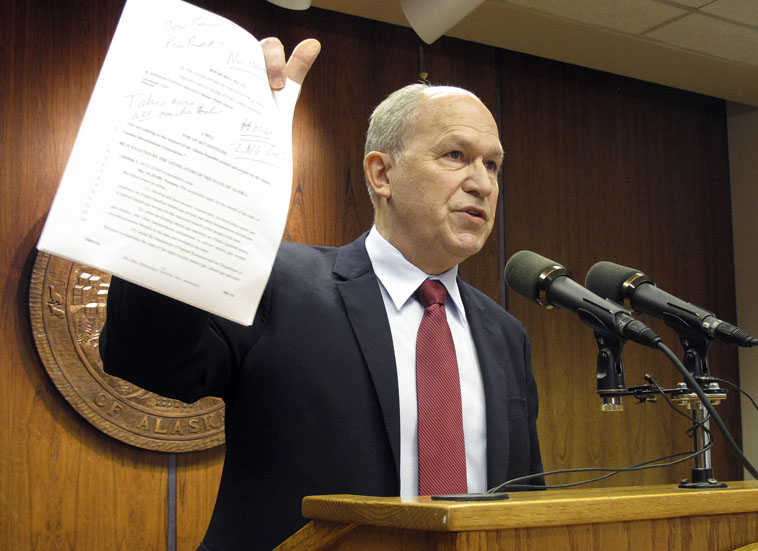JUNEAU — Tensions flared Monday between members of the Alaska House and Gov. Bill Walker over how best to advance state efforts to secure a major gas pipeline project, with a visibly upset Walker denouncing a bill from the speaker of the House as “the most un-Alaskan thing I’ve ever seen put together.”
House Speaker Mike Chenault, R-Nikiski, introduced legislation that would limit the role of a state-backed corporation in an alternate gas line project proposed by Walker. The state has been pursuing a major liquefied natural gas project, known as Alaska LNG, with BP, ExxonMobil Corp., ConocoPhillips, TransCanada Corp. and the Alaska Gasline Development Corp., or AGDC, which Chenault and other lawmakers want to ensure remains the state’s primary focus.
The bill states that the AGDC could not be involved with an alternate export or liquefied natural gas project until the earliest of three events: the state or another party withdrawing from Alaska LNG; Alaska LNG entering its next phase, a decision for which is expected next year; or July 1, 2017. It also says the AGDC cannot market gas owned or controlled by another party without that party’s written consent.
Walker held a news conference to respond to the bill, which he said would hurt the state’s negotiating position with Alaska LNG and promised a veto if it reached his desk. At times, he held up and shook a copy of the bill, scrawled with handwritten notes.
Walker shook things up last month with an opinion piece in which he proposed increasing the size of a smaller stand-alone gas line project, one initially aimed at providing gas to Alaskans, and turning into a project that would be capable of exports in case Alaska LNG faltered. Walker wrote that whichever project was first to produce a “solid plan” with conditions acceptable to the state would get the state’s full support.
Or, he said, the two projects might be combined at some point.
Walker said the state would continue to pursue Alaska LNG. But he said that companies involved in the project have competing projects of their own and it’s appropriate for the state — which has seen a long history of fits and starts on gas line projects — to not pin all its hopes on that one project.
Chenault and other majority lawmakers say they have gotten no greater clarity on Walker’s alternate proposal and are worried about the proposal casting a shadow of uncertainty over Alaska LNG. With a bill, there’s more opportunity to get information about Walker’s plans and to have a fuller discussion, he and others said.
“With all respect, this is what the Legislature does,” said Rep. Mike Hawker, R-Anchorage, adding later: “We are trying to conduct the public’s business in the public.” Hawker is one of the co-sponsors of Chenault’s bill.
House Majority Leader Charisse Millett, R-Anchorage, also a co-sponsor of Chenault’s bill, said she and the other bill supporters stand ready to work with Walker.
Walker said again Monday that he has gotten no pushback from the companies involved in Alaska LNG, including Exxon, with whom he recently met. An Exxon spokeswoman declined to comment.
Walker said he would continue with his gas line plans “until we’re stopped.”
Miles Baker, vice president of external affairs and government relations for the AGDC, said the AGDC would have to be directed by its board to pursue a project with greater capacity, and he thinks that Walker would have to clarify or rescind an administrative order that he signed late last year halting new spending for the stand-alone project.
Walker recently appointed three new members to the AGDC’s seven-member board, which also includes two of his commissioners. The appointees are subject to legislative confirmation.
Baker said the AGDC’s legal counsel also is looking at whether a law change is needed for the AGDC to pursue a larger-scale project.
Sen. Bert Stedman, R-Sitka, said he supports Walker’s approach and is not sure that Chenault’s bill would have the support needed to pass the Legislature.
The dustup follows a decision by members of the House Finance Committee last week to strip provisions related to Medicaid expansion from the operating budget. Walker, who has made Medicaid expansion a priority, has resisted calls from leaders of the GOP-led House majority to introduce a bill of his own on expansion and said there’s an expansion bill from minority Democrats already pending in the House.
Many lawmakers see Medicaid expansion as a major policy call that would be better addressed through committee hearings on a stand-alone bill and say Walker should lead the charge.

